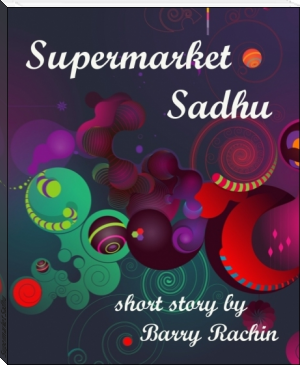Supermarket Sadhu - Barry Rachin (books suggested by elon musk .txt) 📗

- Author: Barry Rachin
Book online «Supermarket Sadhu - Barry Rachin (books suggested by elon musk .txt) 📗». Author Barry Rachin
Supermarket Sadhu
Foot traffic was brisk at the ShopRite Supermarket Saturday afternoon straight through until seven-thirty when the relentless flow dribbled away to a handful of stragglers most of whom made a beeline for the twelve-items-or-less, express register. “Sometimes in India, after a man marries and raises his family, he puts his worldly affairs aside to become a wandering mystic.” Returning from break, seventeen year-old Fanny Jackson blurted the unsolicited musings all in a jumbled heap then, by way of clarification, added, “I’ve been reading up on eastern religion.”
Fanny was working aisle three with Bert Weiner bagging groceries. A retiree who lived off social security, Bert worked part time at the supermarket. The widower owned an olive cape with white shutters off Hathaway Street just a half mile down from Fanny’s house. Sometimes when their schedules coincided, Fanny and Bert carpooled.
“Yeah, I heard something of the sort.” Bert rubbed a hairy earlobe. “I was never big on all that mystical malarkey.”
“You’re Jewish,” Fanny said. “What do your people say about heaven and hell?”
“Not much.” The older man removed a handkerchief from his pocket and blew his nose rather loudly. When he was done he surveyed the end result before crumpling the cloth in his liver-spotted fist and putting it away. “Main thing is you gotta take care of business in the here and now. The next world – the one with all the celestial mumbo jumbo and enraptured souls – takes care of itself.”
To be sure, no self-respecting Sadhu would be caught dead bagging groceries in a backwater town like Brandenberg. Paper or plastic – such inanity did nothing to facilitate one’s spiritual unfolding. Fanny had seen a potpourri of colorful pictures accompanying a National Geographic article featuring the wandering mendicants of Bombay and Calcutta – religious zealots who made pilgrimages to the various holy sites. Sadhu or sanyasi – those were the terms the magazine used to describe the holy men. Some resorted to extreme measures like sleeping on beds of nails, taking lengthy vows of silence, bathing in icy streams or standing motionless on one leg for prolong periods to rid themselves of material cravings and merge with the divine essence. Others smoked hashish and cannabis – not that Fanny was about to share that miscellany with straight-laced Bert Weiner. They painted their faces with outlandishly garish designs, let their hair grow down to their waists or roamed about buck naked! Many had led sedate, conventional lives before turning to the spiritual path. They held jobs, joined civic organizations, paid taxes and participated in local government. Only after their own children were grown did they turn their backs on the material world. And yet, not all Sadhus were straight shooters. Wallowing in debt, rotten marriages or dead-end jobs, some older men took on the yellow mantle of the religious zealot as a pretext for deserting their wives and family obligations.
The outside lights blazed, flooding the parking lot in a mellow, amber glow. “You’re graduating in June?” Bert Weiner asked shifting gears.
“Yes, this is my senior year.”
“Heard yet from any colleges?” Mr. Weiner was leaning against the checkout counter. He wore a pink, ShopRite Supermarket smock plus a nametag with a happy face that looked a bit silly on such a slight man.
“No. Not yet.”
“How’d you do on your SAT’s?”
“Twenty-one fifty,” Fanny replied.
“You don’t say!” He shook his head up and down appraisingly. “That should get you into most Ivy League colleges.”
“So I’ve heard.” Though she had effectively left her classmates pawing in the dust, the brittle numbers meant nothing to Fanny. SAT’s were just a cunning shell game with each private college raising the ante, charging exorbitant tuition and dorm fees for the privilege of attending. A young woman negotiated a shopping cart up to her register. Fanny flipped on the conveyor belt and the endless parade of brown eggs, butternut squash, TV dinners and fresh vegetables crawled toward the scanner.
Mr. Weiner waited until the first few items collided at the far end of the checkout counter before raising his eyes. “Would you prefer paper or plastic?”
Fanny left work a little after nine. Bert had already gone home a few hours earlier. She drove out of the parking lot and was passing through the center of town when she saw her brother, Norman, coming out of a 7-Eleven with a soft drink. She recognized him not so much from his physical features, which were obscured in shadows, as from his slouching, rubbery gait. The lanky youth, who had a hooded sweatshirt pulled up over his head, scurried across the street at a diagonal, disappearing into the Veterans Park that bordered the downtown area. At the next traffic light, Fanny caught sight of Norman again seated on a bench next to the Vietnam memorial and talking energetically on a cell phone. Pulling over to the curb alongside a slender elm, she killed the engine.
The park was empty, shrouded in muddied darkness except for a row of lamps bordering the street. Five minutes passed. A slovenly youth in his early twenties ducked into the park from the far side and approached. Sporting a scraggily goatee and torn jeans, he dropped a backpack he was carrying on the bench. The twosome bantered back and forth for a while. Norman handed his friend an envelope; the man jerked upright, disappearing into the darkness. Pulling an unfiltered cigarette from a pack, Norman lit the smoke and inhaled deeply then, reaching over with his free hand, he tugged the backpack firmly up against his hip.
The previous spring, Fanny’s brother was caught selling two ounces of marijuana to an undercover police officer in the west end of the city. As a first offense, he received a year’s probation. By the size of the backpack, Fanny estimated Norman had bought at least two pounds of weed. For sure, he would divide the twigs and leaves into thirty-two, one-ounce packets, skimming a modest amount from each bag for his own, recreational use. “Nothing ever changes,” Fanny muttered. Turning the engine over, she put the car in gear and eased away from the curb. In the rearview mirror she could see her brother still sprawled out on the bench with his legs askew, a cloud of smoke snaking from his nostrils.
Fanny went home, took a shower and washed her hair. At eleven o’clock she flicked on the TV and settled down in the den with the evening news. A roadside bomb in Iraq had killed three American servicemen; a second bomb exploded outside a Sunni mosque shortly after evening prayers. “There’s never any good news.” Fanny’s mother shuffled into the room and slumped down next to her daughter. She had a cup of tea in one hand and an asiago bagel slathered with chive cream cheese in the other. “How was your day, sweetheart?”
“Pretty good.” The front door opened and Norman glided down the hallway without bothering to acknowledge anyone. Out of the corner of her eye, Fanny caught a fleeting glimpse of a blue, Adidas backpack trimmed with silver piping.
So now the drugs were in the house, putting everyone in the family at risk. Not that a blithering idiot like Norman would recognize a causal relationship. Why should he? It wasn’t like the emotional derelict had any intention of ever working an honest job. When the news faded to commercial break, Fanny got up and wandered down the hallway to her brother’s room. Norman lay on an unmade bed, his bare feet dangling over the side. “What’s up?”
“Nothing.” Stepping over the threshold, Fanny noted that the shades, which had been raised earlier, were drawn. A pile of candy wrappers was scattered about the floor close by a wastepaper basket and clot of dirty underwear thrown in a heap near the closet. The air reeked of rancid body odor shot through with marijuana; a half-smoked roach balanced tipsily on a porcelain saucer called into service as an impromptu ashtray.
He brushed a mop of greasy brown hair away from his eyes. “You need a lift to the supermarket tomorrow?”
“No, Mr. Weiner’s gonna swing by.” Norman wiggled his rear end and farted – intentionally and loud as he possibly could. Fanny was unimpressed. “When are you going to get a real job?”
“I got some irons in the fire.” Reaching over, he grabbed the roach, raised the weed to his lips and lit the end with a cigarette lighter. “Wanna toke?” Fanny shook her head. The ‘irons in the fire’ nonsense was nothing more than a stock phrase, a knee-jerk reaction. Norman hadn’t done much of anything since flunking out of Rhode Island Junior College in the second semester of his freshman year. More to the point, he hadn’t been on a serious job interview in over eight months.
“They’re looking for help at the market.”
“Yeah, thanks a million. Maybe I’ll put in an application." He took a second hit, sucking the sweet drug deep into his lungs and holding it there until his breath ran out. “That horny old widower ever try to get fresh with you?”
“What?” Fanny couldn’t follow his fractured logic.
“Old man Weiner … when the two of you are driving to work, does he ever try to put his hands - ”
“Oh, for God’s sake! Bert's the nicest guy in the world,” Fanny fumed. “A goddamn saint!”
“Awesome!” Norman reached for the joint a third time, but thought better of it and lay back prone. “So this old geezer who bags groceries at the supermarket is really an enlightened master. Bert Weiner with his baggy, polyester trousers and Izod shirts is living his life under false pretenses.” Her brother began to giggle uncontrollably; she couldn’t be sure how much of it was the dope, how much a byproduct of limited intelligence. Fanny waved her hands, a futile gesture, trying to conjure up a reasonable response. She had resigned herself to the unsettling fact that Norman was a boob, an intellectual cretin. The evidence was irrefutable. She heard through a friend-of-a-friend that Norman recently acquired a personal stash of high-grade Maui-wowi. The glassy eyes and supercilious expression suggested that he may have gotten a tad more than he bargained for.
“Maharishi Weiner,” Norman quipped, bursting out in another paroxysm of giddy hysterics. He grabbed up what was left of the wilted weed, ran a flame over the blackened stub and waved the crumpled roach in the air as his sister reached for the door. “Tomorrow night, be sure to give the Enlightened One my regards.”
“Two pieces of mail were addressed to you,” Mrs. Jackson noted, when Fanny returned to the living room.
“Yes, I know.”
The woman pressed her lips together and studied her daughter with cautious ambivalence. “You didn’t open them?”
“No, not yet.” On the news the Mayor of North Providence, Rhode Island, was being interviewed over a brewing scandal. Retired firefighters were still receiving hefty clothing allowances even though they no longer actively worked for the town. The mayor seemed morally outraged that anyone would question the matter, and when the reporter demanded to know why tax payers should buy clothing for retirees with cushy union pensions, the mayor interrupted with a barrage of nonsensical rebuttals.
Fanny could picture her brother two doors over groping about for





Comments (0)